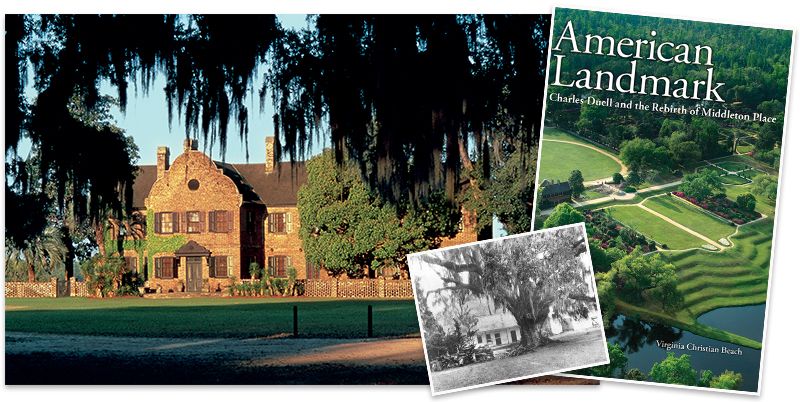Read Stephanie Hunt’s review

(Left) The surviving South Flanker was part of a three-building residential complex; (inset) The circa-1870 freedman’s dwelling, known today as Eliza’s House.
I’ve wandered the labyrinthian gardens umpteen times. Toured the house museum, coveted the camellias, chased my girls along the vast lawns. I’ve wiped away tears reading the litany of names at Eliza’s House, a former freedman’s cabin turned memorial to the enslaved. I have spent many hours at the always haunting, always enchanting Middleton Place. I know its rich and storied past. Even so, my copy of American Landmark: Charles Duell and the Rebirth of Middleton Place (Evening Post Books, March 2022) is dog-eared and fringed with sticky notes marking pages I want to come back to.
I didn’t expect to learn so much from Virginia Beach’s new book on the 18th-century Ashley River plantation and home of “America’s Oldest Landscaped Gardens,” but as author of Rice and Ducks (2014) and Medway (1999, both Evening Post Books), among other titles, Beach brings a deft hand to sensitive topics related to plantations and preservation. The book is not only masterfully researched, but also dynamic and engaging, much like Middleton Place itself.
Beach condenses a fascinating and nuanced history—traipsing through pedigreed genealogies of Middletons, Izards, Rutledges, and Pringles and offering a Cliff Notes for history students on various signers of the Declaration of Independence, governors, and powerful landowners. Most importantly, the book deals head on with conversations about race, slavery, and how a landmark such as Middleton Place is forever marked by its exploitative past—and how that acknowledgment is shaping its future.
Watch the trailer for a 2017 documentary about the enslaved people who lived and toiled at Middleton Place.
Beyond the Fields - Slavery at Middleton Place from Sunhead Projects on Vimeo.
Under the leadership of Middleton descendant Charles Duell, who inherited the property in 1971, along with the Middleton Place Foundation board of directors and staff members, the National Historic Landmark property has been telling an inclusive history since the 1990s, long before George Floyd’s murder and the Black Lives Matter movement again elevated the issue in our national consciousness. Eliza’s House opened in 1991, marking Middleton Place’s first African American interpretative program, honoring the West African origins of the 2,000-some enslaved laborers on the Middleton properties. In 2006, Middleton Place hosted an inaugural joint Middleton family reunion, a gathering of descendants of the European family and of those whom they had enslaved.
In Beach’s account, these efforts and other ongoing initiatives don’t come off as a woke pat-on-the-back, but as an honest reckoning with how challenging and imperfect Middleton Place’s attempt has been—and how room for growth remains.
American Landmark also pays homage to Duell’s 50-plus years stewarding a family inheritance and transforming it into a celebrated historic site. This is a story of place, passion, preservation, and the long arc of history—an arc that encompasses all who love the Lowcountry.
Click here to read our 2012 story about one of the reunions held at Middleton Place.